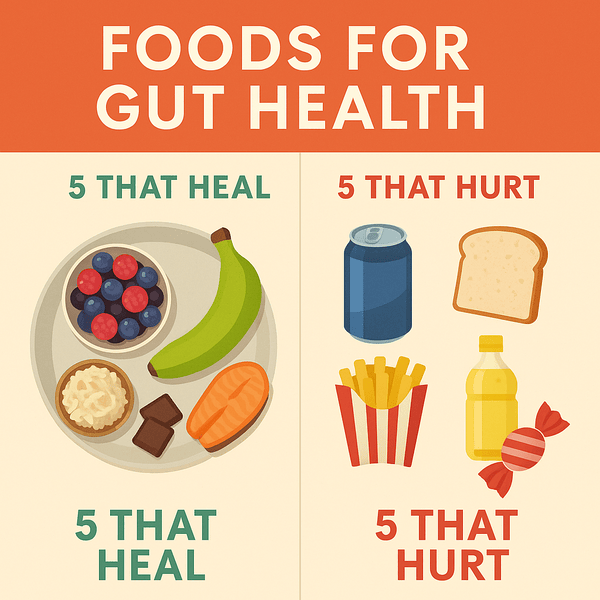Introduction
We’ve all heard the saying: “You are what you eat.” However, science shows it’s more accurate to say: you are what your microbes eat. The truth is, the foods you choose daily are powerful foods for gut health, shaping energy, digestion, and even resilience. The trillions of bacteria in your gut thrive—or suffer—based on your daily diet. Some foods nourish beneficial microbes, improving digestion, mood, and energy. On the other hand, others disrupt balance and fuel fatigue.
This list highlights five surprising foods for gut health that heal your microbiome—and five that may quietly harm it.
5 Foods for Gut Health That Heal Your Microbiome
1. Polyphenol-Rich Berries
Blueberries, raspberries, and blackberries are loaded with polyphenols. As a result, they boost microbial diversity and reduce inflammation (NIH).
2. Green Bananas & Resistant Starch Foods
Unripe bananas, oats, and cooked-then-cooled rice contain resistant starch. In fact, this prebiotic fiber ferments into SCFAs like butyrate, which fuel colon health (NIH).
3. Fermented Foods
Sauerkraut, kimchi, kefir, and miso introduce probiotics. Moreover, research shows fermented foods increase microbial richness while reducing inflammation (NIH).
4. Fatty Fish (Omega-3 Source)
Salmon and sardines deliver omega-3 fatty acids. Consequently, these fats lower gut inflammation and promote growth of beneficial bacteria (NIH).
5. Dark Chocolate (in Moderation)
Dark chocolate is rich in flavonoids. For example, these compounds feed gut microbes, producing metabolites that support mood and cognition (NIH).
5 Foods That Harm Gut Health and Fuel Dysbiosis
1. Artificial Sweeteners
Compounds like aspartame and sucralose can disrupt microbial diversity. As a result, they may worsen glucose intolerance (NIH).
2. Emulsifiers and Additives
Common in processed foods, emulsifiers alter gut barrier function. Therefore, they promote inflammation and dysbiosis (NIH).
3. Refined Carbohydrates
White bread, pastries, and sugary cereals feed harmful bacteria and yeast. Consequently, this accelerates dysbiosis and gut permeability.
4. Seed Oils (Excess Omega-6)
Soybean and corn oils are high in omega-6 fatty acids. When consumed in excess, they fuel inflammation and disrupt balance (NIH).
5. Alcohol (Especially Beer & Spirits)
Excess alcohol reduces beneficial bacteria and increases gut permeability. As a consequence, this drives systemic inflammation and fatigue (NIH).
Putting Foods for Gut Health Into Daily Strategy
The key to lasting gut health is not perfection, but precision. By swapping soda for kefir, candy for dark chocolate, and fried foods for salmon, you steadily reshape your microbiome. In turn, this supports better digestion, energy stability, and resilience.
Key Takeaways on Foods for Gut Health
-
The microbiome thrives on polyphenols, resistant starch, fermented foods, and omega-3s.
-
Artificial additives, excess sugar, alcohol, and seed oils disrupt balance.
-
Even small dietary choices compound to strengthen—or weaken—your gut.
-
Healing your gut through food is a performance strategy, not just a health fix.
Call to Action
At Heal Hub Advisers, we help executives and professionals design nutrition plans that align with gut health and high performance.
👉 Download our free Microbiome Nutrition Guide to discover the best foods for gut health and energy.


